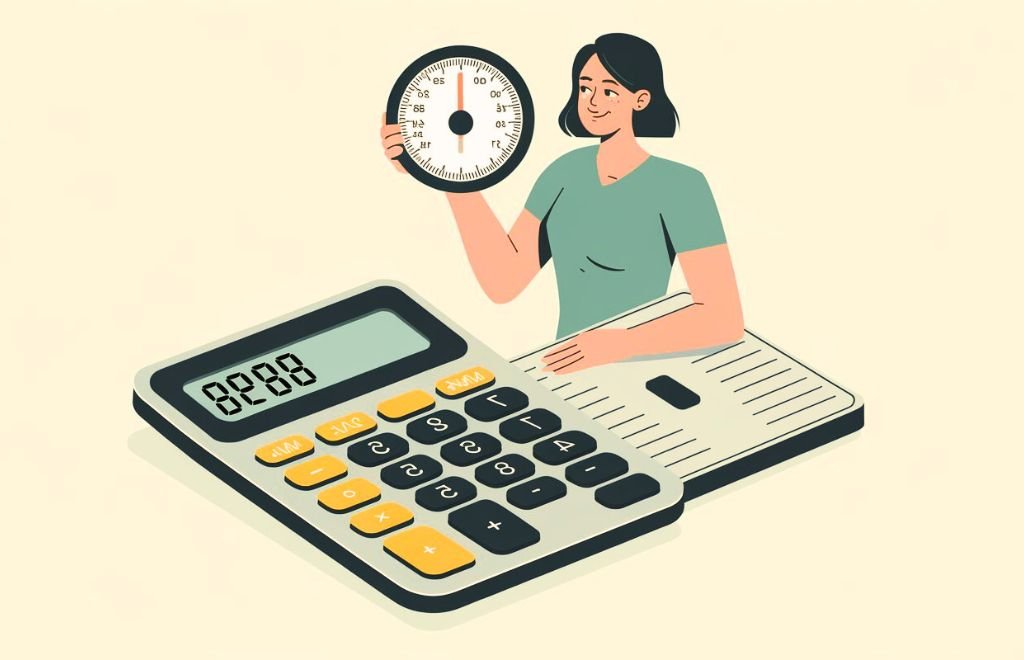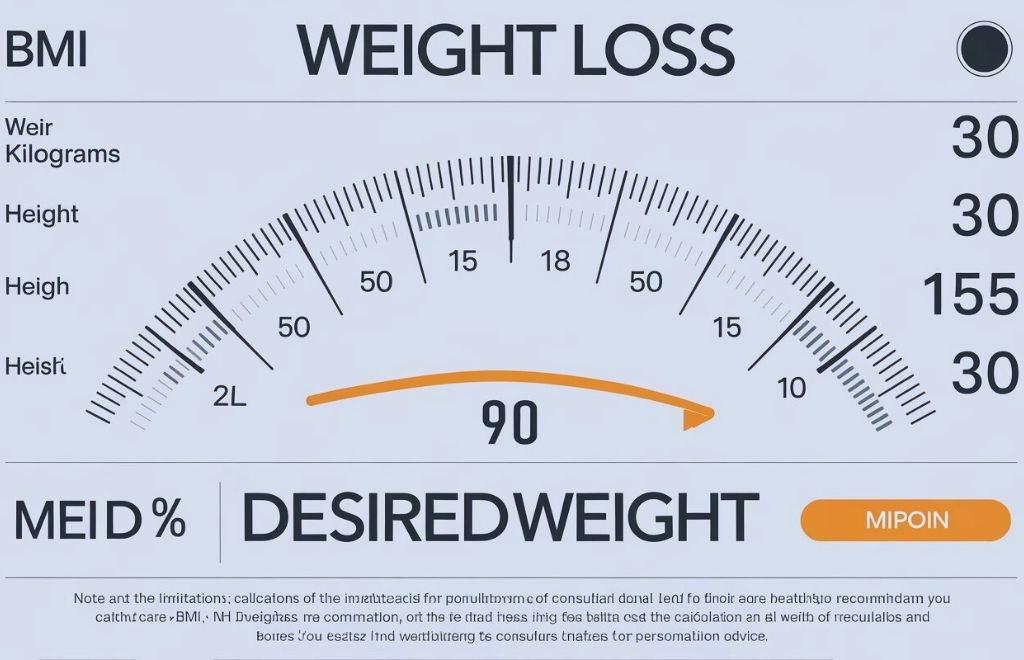In the labyrinth of fitness objectives and health goals, a weight loss calculator emerges as your reliable compass, guiding you through the twists and turns of your own change. But what exactly is this digital ally, and how may it revolutionize your pursuit for a slimmer, healthier you? Buckle up, my reader, for we’re about to embark on a rollercoaster journey into the intriguing realm of metabolic mathematics and tailored health optimization.

At its foundation, a weight loss calculator is a sophisticated instrument that crunches data faster than you can say “calorie deficit.” It’s not just about basic subtraction; it’s a complicated algorithm that evaluates a plethora of parameters unique to your body and lifestyle. Height, weight, age, exercise level—these are merely a few variables in the delicate equation of your metabolism. But here’s where it gets interesting: the calculator doesn’t just stop at the basics. Oh no, it digs deeper down the rabbit hole of human physiology.
Picture this: you’re standing on the verge of change, ready to take the plunge into a new lifestyle. The weight loss calculator becomes your parachute, providing a safe landing into the world of reasonable expectations. It’s not about crash diets or extreme measures; it’s about sustainable, science-backed techniques customized to your unique needs. But how does it manage this feat of personalization?
The trick is in its capacity to manage numerous factors simultaneously. Your basal metabolic rate (BMR)—the energy your body burns just to keep you alive—is a vital component of the puzzle. A weight reduction calculator worth its salt would consider this in, along with your regular activities. Are you a desk jockey or a construction worker? The calculator knows the difference and adjusts accordingly. But it doesn’t stop there. It might even consider the thermic effect of food—yes, that’s right, the calories you burn merely by digesting what you eat!
Now, here’s where it becomes mind-boggling. The human body isn’t a straightforward machine; it’s a wonderland of biochemical activities, each influencing how we burn calories and retain fat. A good weight loss calculator doesn’t just spew out a figure; it educates. It might inform you that to lose a pound, you need to establish a deficit of 3,500 calories. But did you know that this value can fluctuate based on things like your body composition and the sorts of food you consume? The intrigue thickens!
Let’s dig deeper into the rabbit hole of weight loss math. Your body is continuously in flux, responding to the demands you make upon it. This is where the concept of metabolic adaptability comes into play. As you lose weight, your body gets more efficient, using fewer calories to sustain its new, lighter self. A smart calculator can account for this, changing your calorie recommendations as you go on your journey.
But wait, there’s more! The finest weight loss calculators don’t just focus on the numbers; they analyze the quality of your calories too. After all, 100 calories of broccoli and 100 calories of chocolate chip cookies are not made equal from the perspective of your metabolism. Some calculators could also recommend macronutrient ratios, helping you balance proteins, carbohydrates, and fats for optimal fat burning. It’s like having a personal nutritionist and trainer bundled into one, minus the high price tag.
Now, here’s where the burstiness gets in: weight loss isn’t linear. You can notice fast decreases followed by irritating plateaus. Your body could opt to hold onto water weight one week, only to release it entirely the next. A smart calculator can help you navigate these turbulent waters, altering your calorie intake and activity suggestions as your body adjusts. It’s not just about the destination; it’s about knowing and loving the trip.
But let’s not get carried away with the statistics game. While a weight loss calculator is a useful tool, it’s crucial to realize that it’s just that—a tool. It can’t account for the intangibles of your life—tthe stress of a pressing deadline, the delight of a celebration dinner, or the additional calories burned chasing your kid around the park. This is when your intuition and bodily awareness come into play.
As you embark on this road, remember that a weight loss calculator is a guide, not a taskmaster. It’s there to enlighten and educate, not to dictate every bite that crosses your lips. Use it as a starting point, a framework to build upon as you learn to listen to your body’s particular signals and requirements. After all, the most sophisticated calculator in the world can’t replace the wisdom of your own body.

Consider this: your weight reduction journey is like making a symphony. The calculator gives the sheet music, but you’re the conductor. You determine when to speed up the tempo, when to slow down, and when to introduce new instruments (hello, resistance training!). It’s this constant interplay between facts and intuition that makes your journey uniquely yours.
As we navigate through this sea of statistics and equations, it’s easy to lose sight of the greater picture. Weight reduction isn’t only about dropping pounds; it’s about gaining health, vitality, and confidence. A genuinely thorough weight reduction calculator should remind you of this, maybe by including measures beyond just weight—like body dimensions, energy levels, or even mood tracking.
Imagine a future where your weight loss calculator syncs with your smartwatch, your sleep tracker, and even your food shopping list. It may deliver real-time recommendations based on your daily activity, propose foods that meet your calorie goals, and even change your goals based on your sleep quality. We’re not quite there yet, but the possibility is tantalizing.
Conclusion:
In the broad fabric of health and fitness, a weight loss calculator is simply a single thread—albeit an important one. It’s a springboard for knowledge, a catalyst for change, and a beacon of hope for individuals navigating the often rough waters of weight loss. By delivering individualized insights and achievable goals, it empowers you to make informed decisions regarding your health.
But let’s not ignore the human element in this digital world. The most sophisticated calculator can’t replace the encouragement of a friend, the direction of a healthcare professional, or the delight of feeling your clothes fit better. It’s a tool, a strong one, but ultimately, you are the master of your journey.
As you move forward, armed with data and resolve, remember that your worth is not defined by a number on a scale or a figure on a screen. The journey to a healthy you is not just about the goal; it’s about the changing process. A weight reduction calculator might illuminate the route, but it’s your feet that will bring you forward. Weight Loss Calculator
Embrace the intricacy of your body, relish in the burstiness of progress, and let the numbers lead but not dominate your trip. Your journey to health is as unique as your fingerprint, and while a weight loss calculator might provide the map, it’s your courage and determination that will bring you to your goals.
FAQ:
Q: How accurate are weight loss calculators?
While weight loss calculators provide valuable estimations, their accuracy can vary. Factors including individual metabolism, genetic predispositions, and lifestyle subtleties can influence results. Think of them as clever guesstimates rather than crystal balls. They’re most accurate when you submit honest, precise information and use them consistently over time to track trends. Weight Loss Calculator
Q: Can a weight loss calculator replace professional medical advice?
A: Absolutely not! These tools are additions to, not alternatives for, expert counsel. Always speak with healthcare specialists, especially if you have underlying health concerns or specific dietary demands. A calculator can’t detect medical concerns or provide the nuanced, tailored care that a healthcare practitioner can deliver. Weight Loss Calculator
Q: How often should I revise my weight loss goals?
A: As your body changes, so should your calculations. Reassess every 2-4 weeks or after significant lifestyle changes. Remember, your body is a dynamic system, not a static equation. Factors like increasing muscle mass, hormonal changes, or adjustments in activity levels can all effect your calorie needs.
Q: Are all calories truly created equal in weight loss?
A: This is when it gets tricky. While the basic premise of calorie deficit applies, the source of those calories can alter hormones, satiety, and overall health. A decent calculator might incorporate macronutrient balance, not just overall calorie count. For example, protein has a larger thermic impact than fats or carbs, meaning your body burns more calories digesting it.
Q: Can a weight loss calculator aid with muscle gain too?
A: Some advanced calculators incorporate options for body recomposition, balancing fat reduction with muscle gain. However, for specialized goals like bodybuilding, additional equipment and professional supervision are necessary. Muscle building takes a different approach to nutrition and activity compared to pure weight loss.
Q: How do I account for cheat meals or days while using a weight loss calculator?
A: Most calculators don’t have a built-in “cheat meal” capability, but you can manually change your weekly average. Remember, one day of indulgence won’t derail your progress if you’re consistent overall. Some people find it helpful to plan for higher-calorie days by slightly reducing intake on other days.
Q: Can weight loss calculators adapt to my changing metabolism as I lose weight?
A: Sophisticated calculators may incorporate algorithms that account for metabolic adaption. However, it’s vital to periodically update your analytics and pay attention to real-world results. If you find your weight reduction halting despite following the calculator’s recommendations, it might be time to reconsider or visit a specialist.










